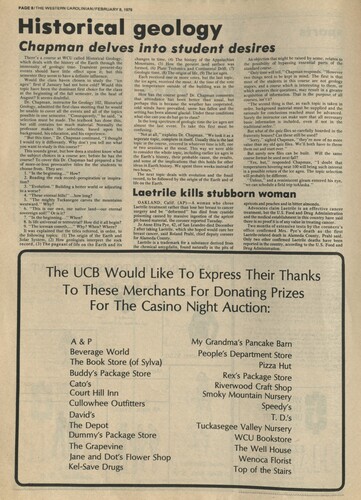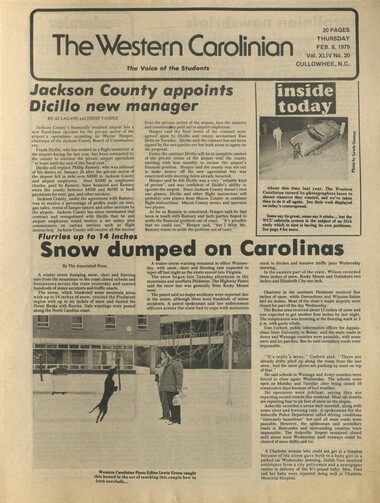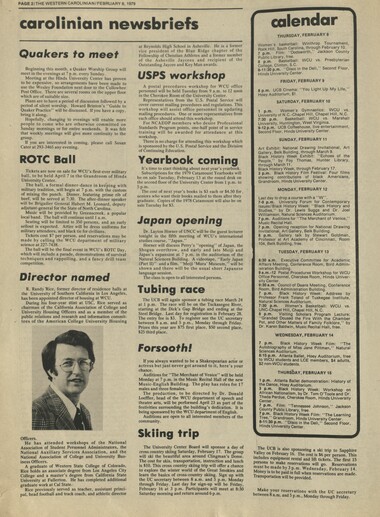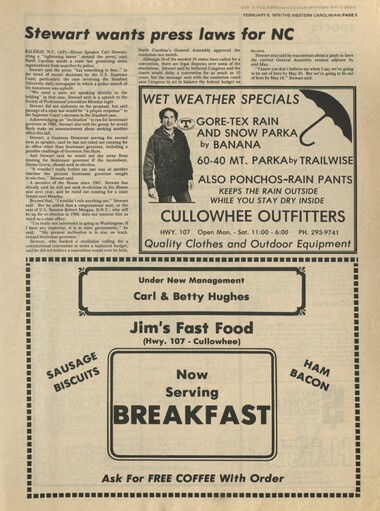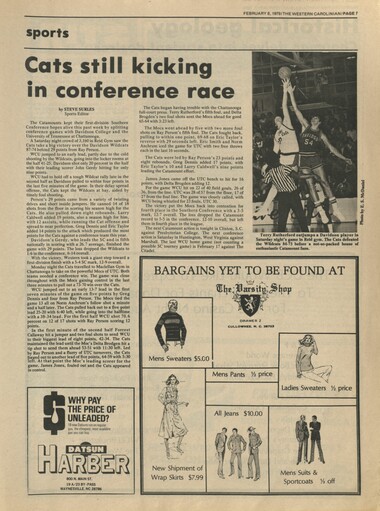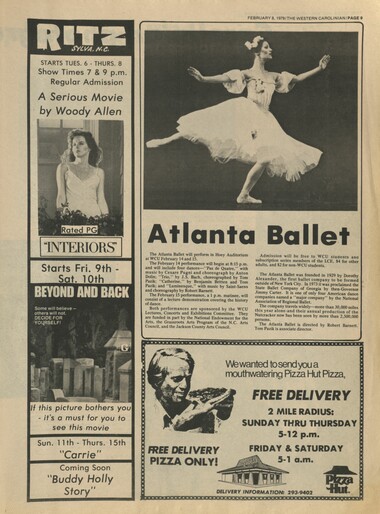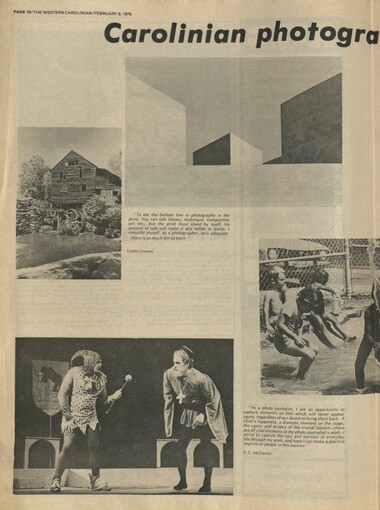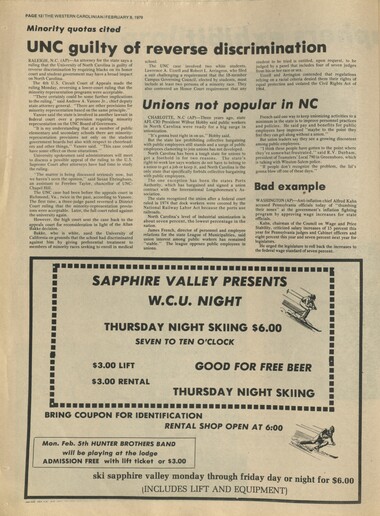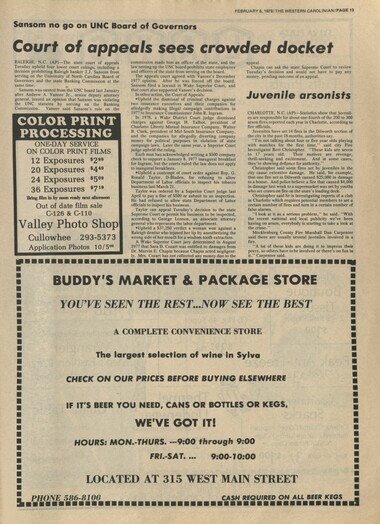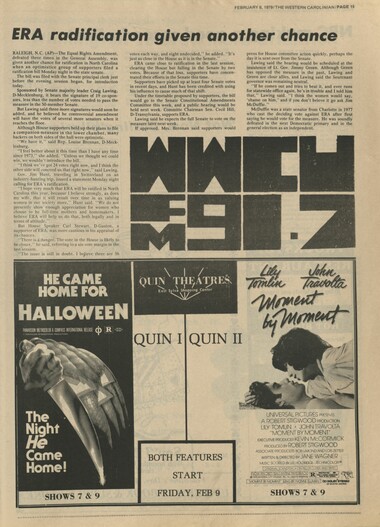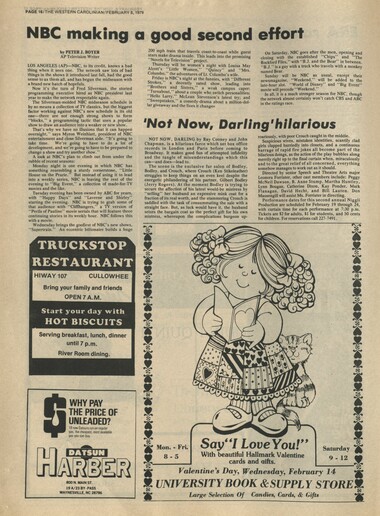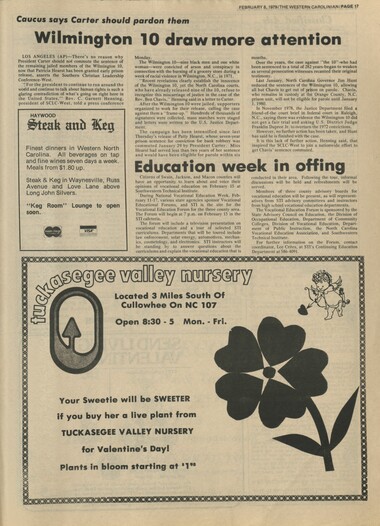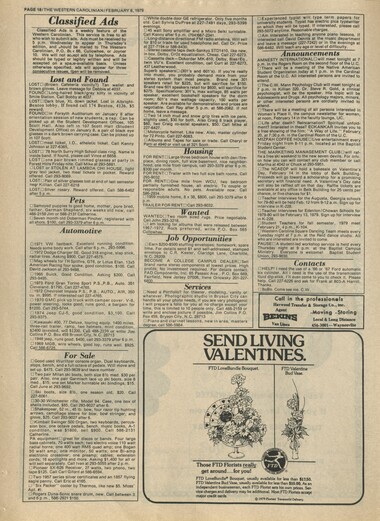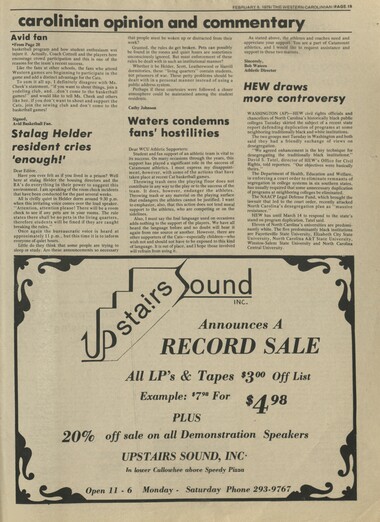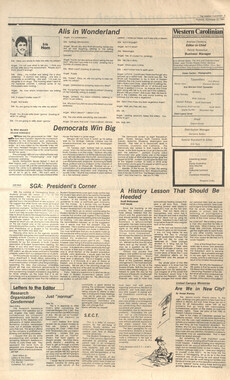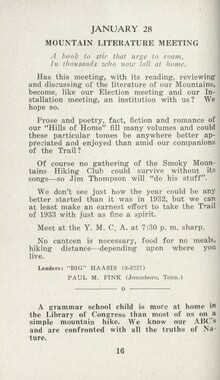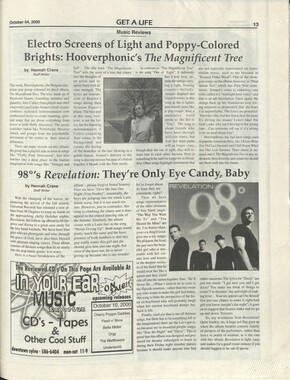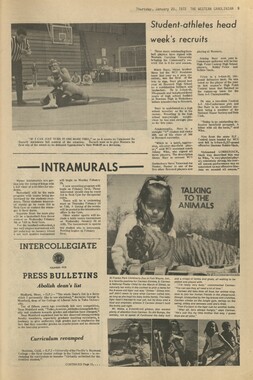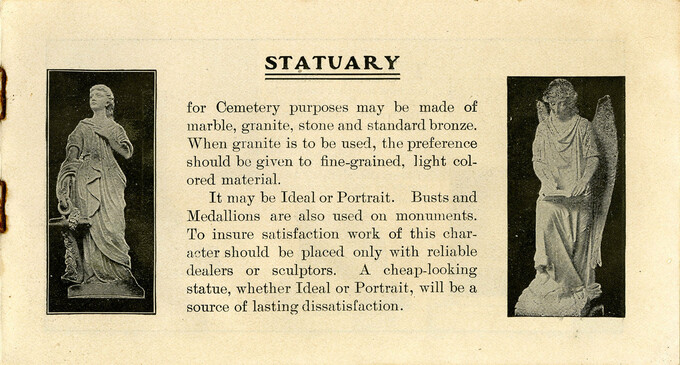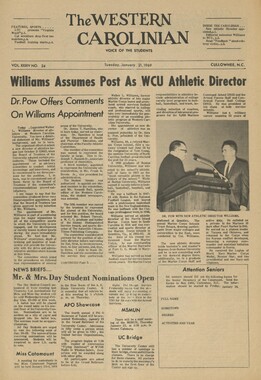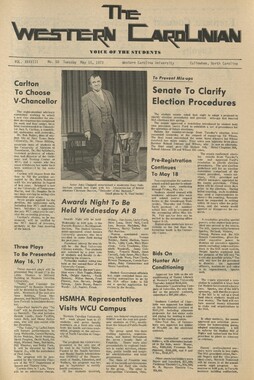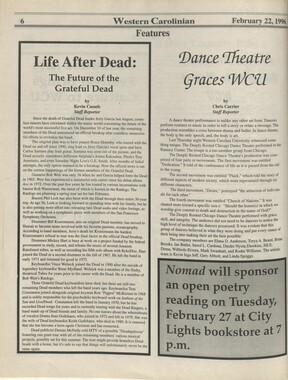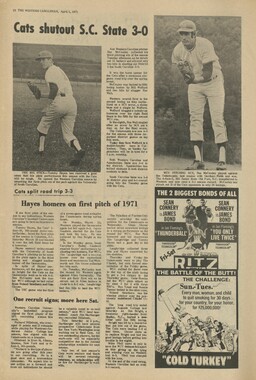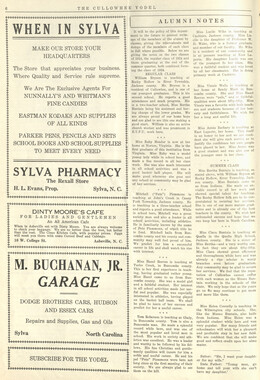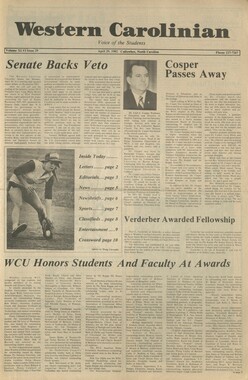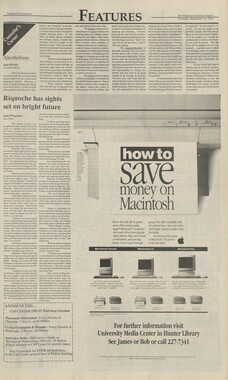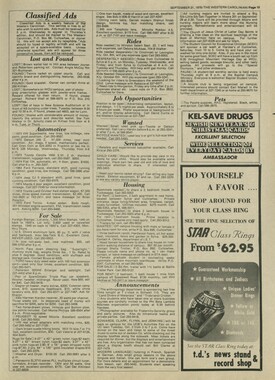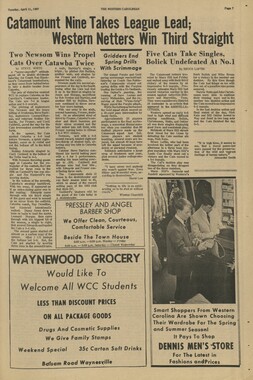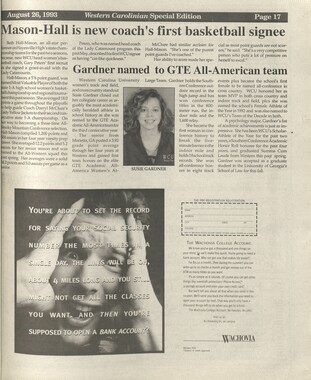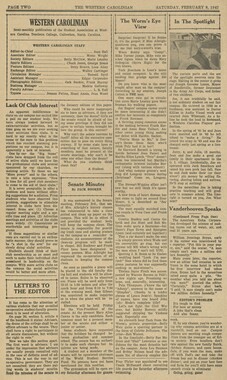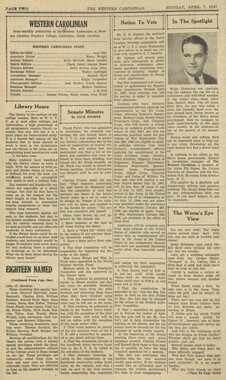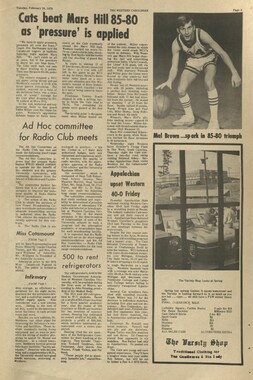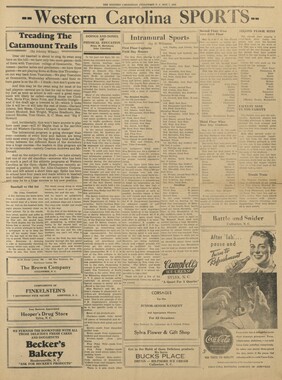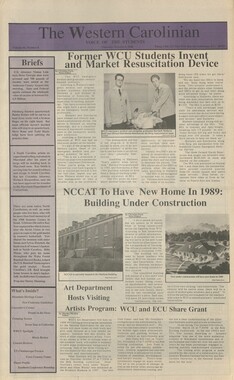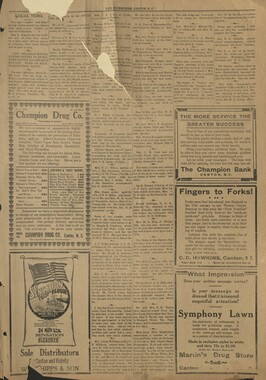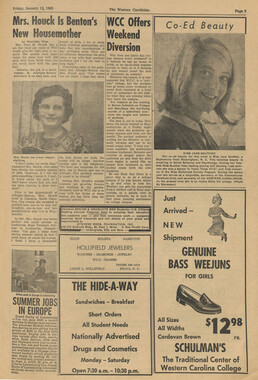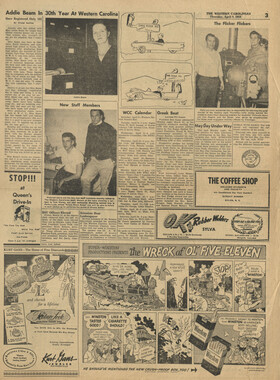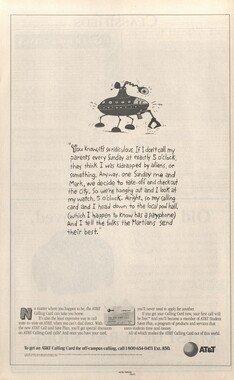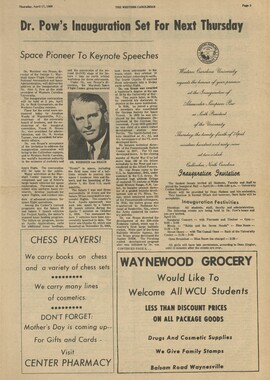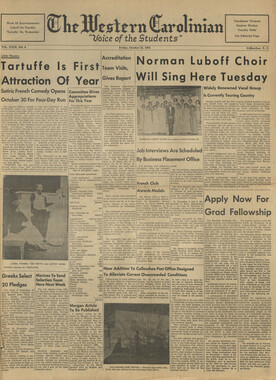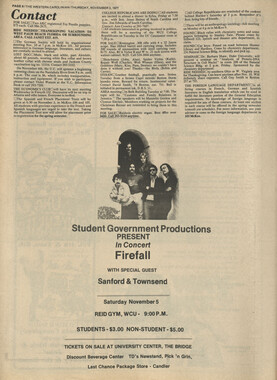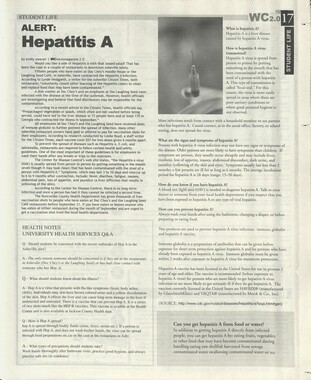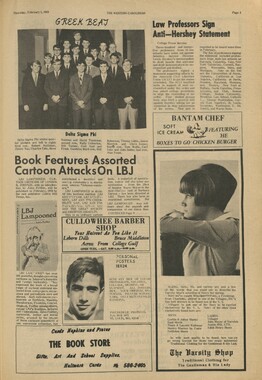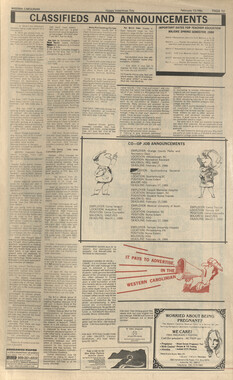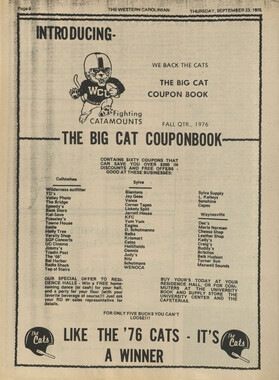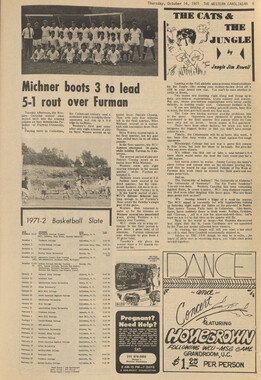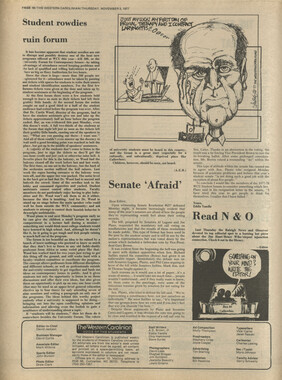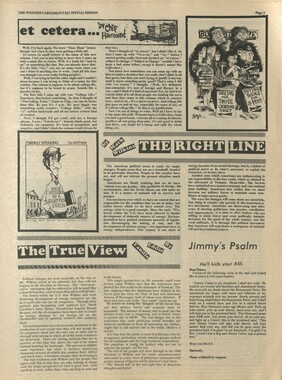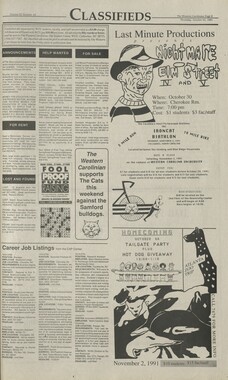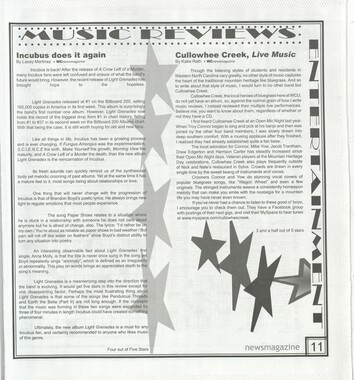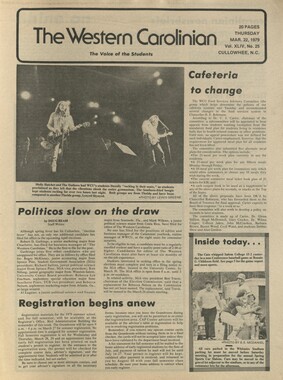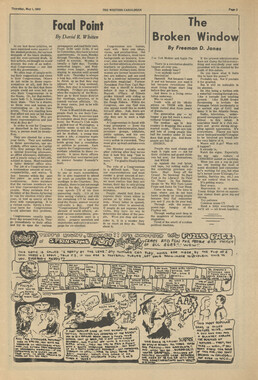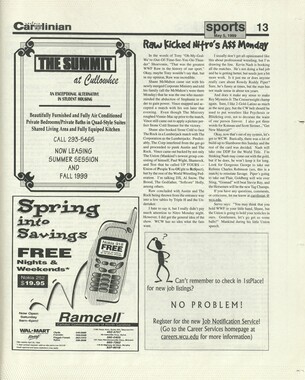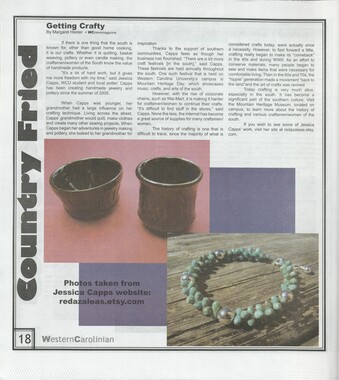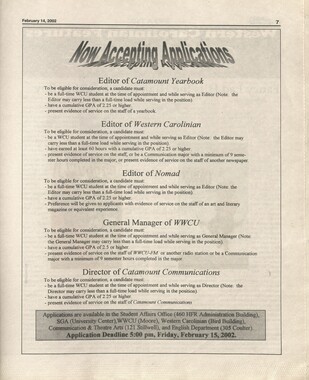Western Carolina University (21)
View all
- Canton Champion Fibre Company (2308)
- Cherokee Traditions (291)
- Civil War in Southern Appalachia (165)
- Craft Revival (1942)
- George Masa Collection (137)
- Great Smoky Mountains - A Park for America (3182)
- Highlights from Western Carolina University (422)
- Horace Kephart (998)
- Journeys Through Jackson (159)
- LGBTQIA+ Archive of Jackson County (90)
- Oral Histories of Western North Carolina (318)
- Picturing Appalachia (6617)
- Stories of Mountain Folk (413)
- Travel Western North Carolina (153)
- Western Carolina University Fine Art Museum Vitreograph Collection (129)
- Western Carolina University Herbarium (92)
- Western Carolina University: Making Memories (738)
- Western Carolina University Publications (2491)
- Western Carolina University Restricted Electronic Theses and Dissertations (146)
- Western North Carolina Regional Maps (71)
- World War II in Southern Appalachia (131)
University of North Carolina Asheville (6)
View all
- Allanstand Cottage Industries (62)
- Appalachian National Park Association (53)
- Bennett, Kelly, 1890-1974 (1463)
- Berry, Walter (76)
- Brasstown Carvers (40)
- Carver, George Washington, 1864?-1943 (26)
- Cathey, Joseph, 1803-1874 (1)
- Champion Fibre Company (233)
- Champion Paper and Fibre Company (297)
- Cherokee Indian Fair Association (16)
- Cherokee Language Program (22)
- Crowe, Amanda (40)
- Edmonston, Thomas Benton, 1842-1907 (7)
- Ensley, A. L. (Abraham Lincoln), 1865-1948 (275)
- Fromer, Irving Rhodes, 1913-1994 (70)
- George Butz (BFS 1907) (46)
- Goodrich, Frances Louisa (120)
- Grant, George Alexander, 1891-1964 (96)
- Heard, Marian Gladys (60)
- Kephart, Calvin, 1883-1969 (15)
- Kephart, Horace, 1862-1931 (313)
- Kephart, Laura, 1862-1954 (91)
- Laney, Gideon Thomas, 1889-1976 (439)
- Masa, George, 1881-1933 (61)
- McElhinney, William Julian, 1896-1953 (44)
- Niggli, Josephina, 1910-1983 (10)
- North Carolina Park Commission (105)
- Osborne, Kezia Stradley (9)
- Owens, Samuel Robert, 1918-1995 (11)
- Penland Weavers and Potters (36)
- Roberts, Vivienne (15)
- Roth, Albert, 1890-1974 (142)
- Schenck, Carl Alwin, 1868-1955 (1)
- Sherrill's Photography Studio (2565)
- Southern Highland Handicraft Guild (127)
- Southern Highlanders, Inc. (71)
- Stalcup, Jesse Bryson (46)
- Stearns, I. K. (213)
- Thompson, James Edward, 1880-1976 (226)
- United States. Indian Arts and Crafts Board (130)
- USFS (683)
- Vance, Zebulon Baird, 1830-1894 (1)
- Weaver, Zebulon, 1872-1948 (58)
- Western Carolina College (230)
- Western Carolina Teachers College (282)
- Western Carolina University (2008)
- Western Carolina University. Mountain Heritage Center (18)
- Whitman, Walt, 1819-1892 (10)
- Wilburn, Hiram Coleman, 1880-1967 (73)
- Williams, Isadora (3)
- Cain, Doreyl Ammons (0)
- Crittenden, Lorraine (0)
- Rhodes, Judy (0)
- Smith, Edward Clark (0)
- Appalachian Region, Southern (3032)
- Asheville (N.C.) (1945)
- Avery County (N.C.) (26)
- Blount County (Tenn.) (200)
- Buncombe County (N.C.) (1680)
- Cherokee County (N.C.) (283)
- Clay County (N.C.) (556)
- Graham County (N.C.) (247)
- Great Smoky Mountains National Park (N.C. and Tenn.) (535)
- Haywood County (N.C.) (3573)
- Henderson County (N.C.) (70)
- Jackson County (N.C.) (4926)
- Knox County (Tenn.) (61)
- Knoxville (Tenn.) (21)
- Lake Santeetlah (N.C.) (14)
- Macon County (N.C.) (421)
- Madison County (N.C.) (216)
- McDowell County (N.C.) (39)
- Mitchell County (N.C.) (135)
- Polk County (N.C.) (35)
- Qualla Boundary (982)
- Rutherford County (N.C.) (78)
- Swain County (N.C.) (2187)
- Transylvania County (N.C.) (270)
- Watauga County (N.C.) (12)
- Waynesville (N.C.) (86)
- Yancey County (N.C.) (72)
- Aerial Photographs (3)
- Aerial Views (60)
- Albums (books) (4)
- Articles (1)
- Artifacts (object Genre) (228)
- Bibliographies (1)
- Biography (general Genre) (2)
- Cards (information Artifacts) (38)
- Clippings (information Artifacts) (193)
- Copybooks (instructional Materials) (3)
- Crafts (art Genres) (622)
- Depictions (visual Works) (21)
- Design Drawings (1)
- Digital Moving Image Formats (2)
- Drawings (visual Works) (185)
- Envelopes (115)
- Exhibitions (events) (1)
- Facsimiles (reproductions) (1)
- Fiction (general Genre) (4)
- Financial Records (12)
- Fliers (printed Matter) (67)
- Glass Plate Negatives (381)
- Guidebooks (2)
- Internegatives (10)
- Interviews (823)
- Land Surveys (102)
- Letters (correspondence) (1070)
- Manuscripts (documents) (618)
- Maps (documents) (177)
- Memorandums (25)
- Minutes (administrative Records) (59)
- Negatives (photographs) (6192)
- Newsletters (1290)
- Newspapers (2)
- Notebooks (8)
- Occupation Currency (1)
- Paintings (visual Works) (1)
- Pen And Ink Drawings (1)
- Periodicals (194)
- Personal Narratives (10)
- Photographs (12977)
- Plans (maps) (1)
- Poetry (6)
- Portraits (4573)
- Postcards (329)
- Programs (documents) (181)
- Publications (documents) (2444)
- Questionnaires (65)
- Relief Prints (26)
- Sayings (literary Genre) (1)
- Scrapbooks (282)
- Sheet Music (2)
- Slides (photographs) (402)
- Songs (musical Compositions) (2)
- Sound Recordings (802)
- Specimens (92)
- Speeches (documents) (18)
- Tintypes (photographs) (8)
- Transcripts (329)
- Text Messages (0)
- A.L. Ensley Collection (275)
- Appalachian Industrial School Records (7)
- Appalachian National Park Association Records (336)
- Axley-Meroney Collection (2)
- Bayard Wootten Photograph Collection (20)
- Bethel Rural Community Organization Collection (7)
- Blumer Collection (5)
- C.W. Slagle Collection (20)
- Canton Area Historical Museum (2110)
- Carlos C. Campbell Collection (564)
- Cataloochee History Project (64)
- Cherokee Studies Collection (4)
- Daisy Dame Photograph Album (5)
- Daniel Boone VI Collection (1)
- Doris Ulmann Photograph Collection (112)
- Elizabeth H. Lasley Collection (1)
- Elizabeth Woolworth Szold Fleharty Collection (4)
- Frank Fry Collection (95)
- George Masa Collection (173)
- Gideon Laney Collection (452)
- Hazel Scarborough Collection (2)
- Hiram C. Wilburn Papers (28)
- Historic Photographs Collection (236)
- Horace Kephart Collection (861)
- Humbard Collection (33)
- Hunter and Weaver Families Collection (1)
- I. D. Blumenthal Collection (4)
- Isadora Williams Collection (4)
- Jesse Bryson Stalcup Collection (47)
- Jim Thompson Collection (224)
- John B. Battle Collection (7)
- John C. Campbell Folk School Records (80)
- John Parris Collection (6)
- Judaculla Rock project (2)
- Kelly Bennett Collection (1482)
- Love Family Papers (11)
- Major Wiley Parris Civil War Letters (3)
- Map Collection (12)
- McFee-Misemer Civil War Letters (34)
- Mountain Heritage Center Collection (4)
- Norburn - Robertson - Thomson Families Collection (44)
- Pauline Hood Collection (7)
- Pre-Guild Collection (2)
- Qualla Arts and Crafts Mutual Collection (12)
- R.A. Romanes Collection (681)
- Rosser H. Taylor Collection (1)
- Samuel Robert Owens Collection (94)
- Sara Madison Collection (144)
- Sherrill Studio Photo Collection (2558)
- Smoky Mountains Hiking Club Collection (616)
- Stories of Mountain Folk - Radio Programs (374)
- The Reporter, Western Carolina University (510)
- Venoy and Elizabeth Reed Collection (16)
- WCU Gender and Sexuality Oral History Project (36)
- WCU Mountain Heritage Center Oral Histories (25)
- WCU Oral History Collection - Mountain People, Mountain Lives (71)
- WCU Students Newspapers Collection (1923)
- Western North Carolina Tomorrow Black Oral History Project (69)
- William Williams Stringfield Collection (2)
- Zebulon Weaver Collection (109)
- African Americans (390)
- Appalachian Trail (35)
- Artisans (521)
- Cherokee art (84)
- Cherokee artists -- North Carolina (10)
- Cherokee language (21)
- Cherokee pottery (101)
- Cherokee women (208)
- Church buildings (190)
- Civilian Conservation Corps (U.S.) (114)
- College student newspapers and periodicals (2012)
- Dams (115)
- Dance (1023)
- Education (222)
- Floods (63)
- Folk music (1015)
- Forced removal, 1813-1903 (2)
- Forest conservation (220)
- Forests and forestry (1198)
- Gender nonconformity (4)
- Great Smoky Mountains National Park (N.C. and Tenn.) (181)
- Hunting (47)
- Landscape photography (25)
- Logging (122)
- Maps (83)
- Mines and mineral resources (9)
- North Carolina -- Maps (18)
- Paper industry (38)
- Postcards (255)
- Pottery (135)
- Railroad trains (72)
- Rural electrification -- North Carolina, Western (3)
- School integration -- Southern States (2)
- Segregation -- North Carolina, Western (5)
- Slavery (5)
- Sports (452)
- Storytelling (243)
- Waterfalls -- Great Smoky Mountains (N.C. and Tenn.) (66)
- Weaving -- Appalachian Region, Southern (280)
- Wood-carving -- Appalachian Region, Southern (328)
- World War, 1939-1945 (174)
Western Carolinian Volume 44 Number 20
Item
Item’s are ‘child’ level descriptions to ‘parent’ objects, (e.g. one page of a whole book).
-
-
PAGE 8/THE WfcSI fcHN CAROLINIAN/FEBRUARY 8, 1979 Historical geology Chapman delves into student desires There's a course at WCU called Historical Geology, which dealt with the history of the Earth through the immensity of geologic time. Transient present-day event! should have little effect upon it; but this semester they seem to have a definite influen Would the class haven chosen to study the "ice ages" first if January had not been cold? Would this topic have been the dominant first choice for the class at the beginning of the fall semester, in the heat of August? It seems doubtful. Dr. Chapman, instructor for Geology 102, Historical Geology, admitted the first class meeting that he would be unable to cover all the events and all of the topics possible in one semester. "Consequently," he said, "a selection must be made. The textbook has done this, but still contains too much material. Normally the professor makes the selection, based upon his background, his education, and his experience. "But this time," Dr. Chapman continued, "I thought I would try it differently. Why don't you tell me what you want to study in this course?" This sounds great, but how does a student know what the subject choices in a course are; before he has the course? To cover this Dr. Chapman had prepared a list of more-or-less provocative titles for the students to choose from. They are: 1. "In the beginning..." How? 2. Reading the rock record-perspiration or inspiration? 3. "Evolution." Building a better world or adjusting to a worse? 4. "These eternal hills!"...how long? 5. "The mighty Tuckasegee carves the mountains westward." Why? ' 6. "This is our own, our native land—our eternal sovereign soil!" Oris it? 7. "In the beginning..." When? 8. Is life universal or terrestrial? How did it all begin? 9. "The iceman cometh,..." Why? When? Where? It was explained that the titles referred, in order, to the following topics: (1) The origin of the Earth and Solar System, (2) How geologists interpret the rock record, (3) The pageant of life on the Earth and its changes in time, (4) The history of the Appalachian Mountains, (5) How the present land surface was formed, (6) Plate Tectonic! and Continental Drift, (7) Geologic time, (8) The origin of life, (9) The ice ages. Each received one or more votes, but the last topic, the ice ages, received the most. At the time of the vote the temperature outside of the building was in the teens. How has the course gone? Dr. Chapman comments that attendance has been better than usual, but perhaps this is because the weather has cooperated, cold winds have prevailed, snow has fallen and the setting has been almost glacial. Under these conditions what else can you do but go to class? In the long spectrum of geologic time the ice ages are almost the last event. To take this first must be confusing. "Not at all," explains Dr. Chapman. "We took it as a seperate topic, complete in itself. Usually this is the last topic in the course, covered in whatever time is left, one or two sessions at the most. This way we were able to consider the whole topic, including earlier ice ages in the Earth's history, their probable cause, the results, and some of the implications that this holds for other ideas in Earth history. We spent three weeks instead of two hours." The next topic deals with evolution and the fossil record, to be followed by the origin of the Earth and of life on the Earth. An objection that might be raised by some, relates to the possibility of bypassing essential parts of the standard course. "Only time will tell," Chapman responds. However two things need to be kept in mind. The first is that most of the students in this course are not geology majors, and a course which is interesting to them, or which answers their questions, may result in a greater acquisition of information. That is the purpose of all courses, isn't it? "The second thing is that, as each topic is taken in order, background material must be supplied and the rationale for conclusions reached must be advanced. Surely the instructor can make sure that all necessary basic information is included, even if not in the traditional order." But what of the quiz files so carefully hoarded in the fraternity houses? Can these still be used? "Sorry," sighed Chapman, "they're now of no more value than my old quiz files. We'll both have to throw them out and start over." But surely new files can be built. Will the same course format be used next fall? "Yes, but," responded Chapman, "I doubt that temperatures hovering near 100 will bring such interest in a possible return of the ice ages. The topic selection will probably be different. "Unless," and a reminiscent gleam entered his eye, "we can schedule a field trip toAlaska." Laetrile kills stubborn woman OAKLAND, Calif. (AP)—A woman who chose Laetrile treatment rather than lose her breast to cancer surgery and be "deformed" has died from cyanide poisoning caused by massive ingestion of the apricot pit-based material, the coroner reported Tuesday. Jo Anne Etta Pye, 42, of San Leandro died December 2 after taking Laetrile, which she hoped would cure her breast cancer, said Roland Prahl, chief deputy coroner for Alameda County. Laetrile is a trademark for a substance derived from the chemical amygdalin, found naturally in the pits of apricots and peaches and in bitter almonds. Advocates claim Laetrile is an effective cancer treatment, but the U.S. Food and Drug Administration and the medical establishment in this country have said there is no proof it is of any value in treating cancer. Two months of extensive tests by the coroners's office confirmed Mrs. Pye's death as the first Laetrile-related death in Alameda County, Prahl said. Only two other confirmed Laetrile deaths have been reported in the country, according to the U.S. Food and Drug Administration. The UCB Would Like To Express Their Thanks To These Merchants For Donating Prizes For The Casino Night Auction: A&P Beverage World The Book Store (of Sylva) Buddy's Package Store Cato's Court Hill Inn Cullowhee Outfitters David's The Depot Dummy's Package Store The Grapevine Jane and Dofs Flower Shop Kel-Save Drugs My Grandma's Pancake Barn People's Department Store Pizza Hut Rex's Package Store Riverwood Craft Shop Smoky Mountain Nursery Speedy's T. D/s Tuckasegee Valley Nursery WCU Bookstore The Well House Wenoca Florist Top of the Stairs
Object
Object’s are ‘parent’ level descriptions to ‘children’ items, (e.g. a book with pages).
-
The Western Carolinian is Western Carolina University's student-run newspaper. The paper was published as the Cullowhee Yodel from 1924 to 1931 before changing its name to The Western Carolinian in 1933.
-

